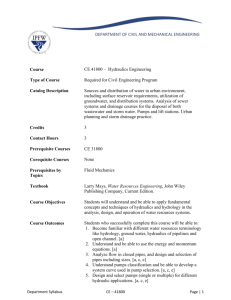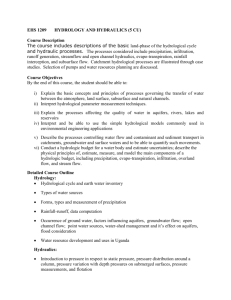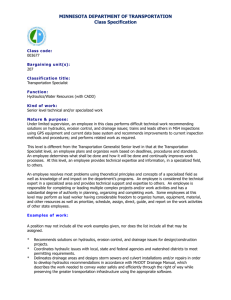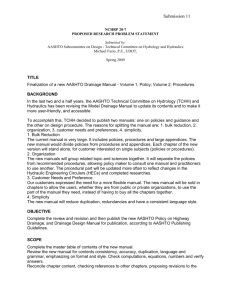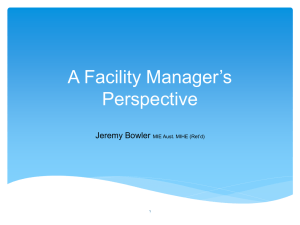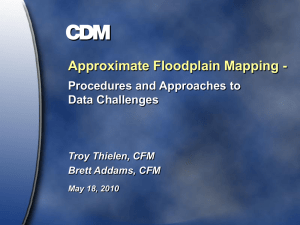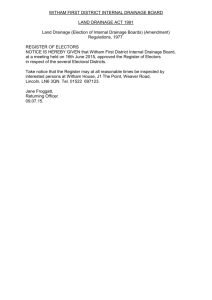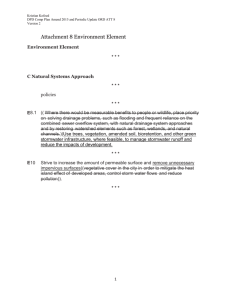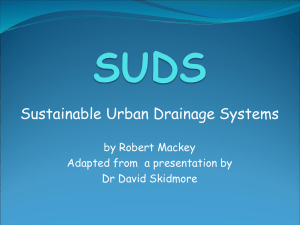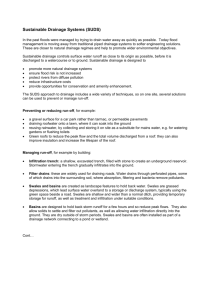Course Introduction - Maritime Research Centre
advertisement
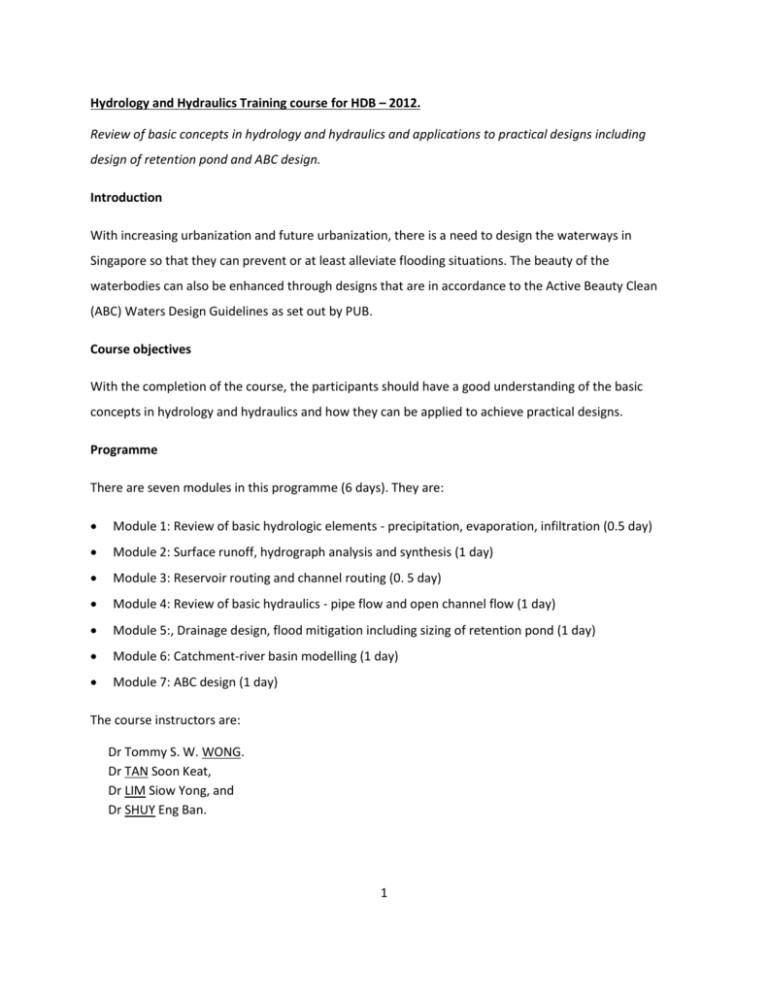
Hydrology and Hydraulics Training course for HDB – 2012. Review of basic concepts in hydrology and hydraulics and applications to practical designs including design of retention pond and ABC design. Introduction With increasing urbanization and future urbanization, there is a need to design the waterways in Singapore so that they can prevent or at least alleviate flooding situations. The beauty of the waterbodies can also be enhanced through designs that are in accordance to the Active Beauty Clean (ABC) Waters Design Guidelines as set out by PUB. Course objectives With the completion of the course, the participants should have a good understanding of the basic concepts in hydrology and hydraulics and how they can be applied to achieve practical designs. Programme There are seven modules in this programme (6 days). They are: Module 1: Review of basic hydrologic elements - precipitation, evaporation, infiltration (0.5 day) Module 2: Surface runoff, hydrograph analysis and synthesis (1 day) Module 3: Reservoir routing and channel routing (0. 5 day) Module 4: Review of basic hydraulics - pipe flow and open channel flow (1 day) Module 5:, Drainage design, flood mitigation including sizing of retention pond (1 day) Module 6: Catchment-river basin modelling (1 day) Module 7: ABC design (1 day) The course instructors are: Dr Tommy S. W. WONG. Dr TAN Soon Keat, Dr LIM Siow Yong, and Dr SHUY Eng Ban. 1 Brief Biography of the Instructors DR TAN SOON KEAT is the Director of Maritime Research Centre and an Associate Professor at the School of Civil and Environmental Engineering, Nanyang Technological University. He joined Nanyang Technological Institute in 1984 and is instrumental in the development of the hydraulics, hydrology, coastal and wind tunnel laboratories. Dr Tan’s research interests include application of geographical information system in water resources, numerical simulation of flow for hydraulics and coastal engineering applications. Beside technical papers, conference presentations and workshops, Dr Tan also provides consultancy services in areas including surge analysis, drainage and hydraulic design, physical and numerical modelling of hydraulic and coastal processes. DR. TOMMY S. W. WONG is a freelance consultant, editor and author. He is the founding editor of the Hydrological Science and Engineering book series published by Nova Science Publishers. He was also an associate editor of the Journal of Hydrologic Engineering published by the American Society of Civil Engineers. Dr. Wong has nearly 10 years' experience in the planning, design and site supervision of civil engineering projects especially flood alleviation projects. He also has 25 years teaching and research experience in hydraulics, hydrology and water resources. He has published five engineering books and more than 60 journal and conference papers. Dr. Wong has received the John Illingworth Prize from Leeds University in 1974, and the J. C. Stevens Award from the American Society of Civil Engineers in 2004. Dr LIM SIOW YONG received both his bachelor and doctoral degrees from the University of Liverpool, U.K. He was with the Department of Civil Engineering, National University of Malaysia (UKM) from 1986 to 1991, and joined the Nanyang Technological University since April 1991. He is an Associate Professor in the Division of Environmental and Water Resources Engineering, School of Civil and Environmental Engineering. His research and consulting works focus mainly on the mechanics of sediment transport, erosion, scouring and deposition phenomena in waterways/hydraulics structures, and urban hydraulics engineering. He has published 39 papers in refereed journals and 35 conference papers. Dr SHUY ENG BAN started his career as a civil engineer with the Singapore Drainage Engineer from 1977 to 1981, during which he was involved in the planning, design and construction supervision of large scale drainage and flood alleviation projects in Singapore. Upon completion of his PhD in 1985, he joined, and remained in NTU (Nanyang Technological University, Singapore) until now. During his 27 years tenure in NTU, he taught many of the water related courses in the areas of fluid mechanics, hydraulics, hydrology and water resources engineering, and was involved in externally funded research projects in such areas as watershed rainfall-runoff monitoring and modeling, integrated urban drainage, stormwater and water resource management, GIS applications in hydrologic and hydraulic modeling, and sustainable urban drainage systems (SUDS). He also served as specialist consultant to many local and overseas companies and public agencies in the areas of storm drainage, flood alleviation and stormwater management, water hammer surge analyses and treatment, water resources engineering, coastal hydraulics and engineering, open/river channel hydraulics and dam-break studies, pipe hydraulics and general fluid mechanics, SUDS/WSUD design features and general hydrology. 2 Module 1: Review of basic hydrologic elements - precipitation, evaporation, infiltration (0.5 day) Instructor: Dr Tommy Wong This module covers the measurement of precipitation, evaporation and infiltration and the analyses of the measured data. Module 2: Surface runoff, hydrograph analysis and synthesis (1 day) Instructor: Dr Tommy Wong This module covers the measurement of surface runoff and the analyses of the runoff hydrograph including hydrograph separation and storage reservoir design. Module 3: Reservoir routing and channel routing (0.5 day) Instructor: Dr Tommy Wong This module covers the techniques to route a hydrograph through a reservoir and through a channel. Module 4: Review of basic hydraulics - pipe flow and open channel flow (1 day) Instructor: Dr Lim Siow Yong The module recaps the basics of pipe flow and open channel flow. Pipe Flow: introduction of pipe flow, friction and head loss, pumping design, pipe-network analysis. Open Channel Flow: Free surface flow, hydraulic and energy grade line. Critical flow and control sections. Gradually varied flow and water surface profiles. Module 5: Drainage design, flood mitigation including sizing of retention pond (1 day) Instructor: Dr Tommy Wong This module covers the concepts and the methodology in carrying out a drainage design. It also covers various options to mitigate a flood, and a method to size a retention pond. 3 Module 6: Catchment-river basin modelling (1 day) Instructor: Dr Tan Soon Keat This module deals with the concept of rainfall-runoff modelling, and discuss the relevant parameters such as rainfall (rainfall patterns and distribution), infiltration and losses (type of land use, terrain, etc), runoff, and flow in the river network system (including various hydraulic structures such as dam and retention ponds, weirs and others). Module 7: ABC design (1 day) Instructor: Dr Shuy Eng Ban PUB’s ABC Waters Program is a vision to transform Singapore’s reservoirs and major rivers, canals and drains into “Active” (dynamic, full of life and activities), “Beautiful” (aesthetically pleasing) and “Clean” (good water quality) streams, rivers and lakes, thus bringing people closer to water, and providing a beautiful environment of gardens and waters for all to enjoy. Sustainable Drainage System (SUDS) or Water Sensitive Urban Design (WSUD) is increasing being implemented as best management practices that address the quantity, quality and amenity aspects of storm water management. SUDS techniques could cover all stages of the surface water management train, from inlet control, source control, site control, to regional control, as well as control along the conveyance systems. The control devices could include green roofs and rainwater harvesting, bioswales or bioretention swales, biotopes, infiltration and recharge systems, wetlands and detention ponds. The hydrologic and hydraulic considerations and constraints in the design and applications of ABC programs and WSUD devices will be discussed in the course, to enable the systems to meet their desired flow attenuation and quality treatment objectives 4
